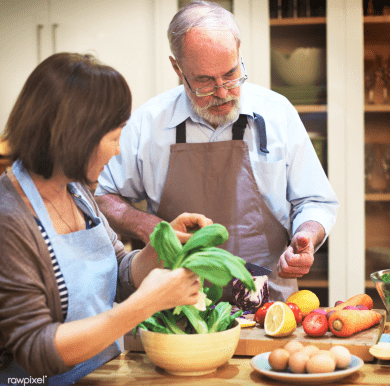
Keeping the elderly healthy
How do we know our elderly folk are taking care of themselves nutritionally? This can be a sensitive subject to discuss with parents and grandparents alike if not approached with care. As time goes by, we seem to lose our appetite and skip the odd meal. Over time, this can escalate into several skipped meals and the nutrition level goes down as a result, particularly if living alone.
In cultures where we see many generations living under the one roof, mealtimes are shared by all. There may be a watchful eye observing how much people are eating. As expats in Thailand, parents and grandparents are only seen during holidays and visits home or abroad. As lifestyles change for raging people, I am sure you will have noticed that when older folk move in with family members or into care facilities, they generally put on weight and this is because the diet of many of our older folk is not very nutritious and they tend to eat irregularly.
When we ask ageing parents or grandparents “Are you eating?”, “can I get you something?”, “Do you need any shopping?” the majority will say, “Oh don’t bother, I’m fine. There is plenty of food in the cupboard.” How many of us go to the cupboard to check? We don’t normally because we do not want to get involved in an argument or make a person feel that they are not in control. The fact of the matter may be that there are not foods in the cupboard for good nutrition. A packet of cracker biscuits, canned soups and a box of sugar cereal with a few potatoes or canned corn is not what one would call nutritious. It is a very delicate issue when we start to enquire into people’s eating habits. Having seen what a lot of young people and parents eat, the aged concern me greatly. They never want to be a bother and will do anything to remove the thought of being a burden to someone. They will also insist that all is well, often for fear of being moved into care facilities.
 Why is it the older folk have such an independent attitude? Well, we must not forget many of them grew up through vary hard economic times and this gave them a sense of values based on overcoming hardship. On the other hand, their offspring, the “baby boomers”, have a very different attitude to life. Moving now more in Gen X, their parents, the baby bombers, are now ageing and a different type of independence is now visible. They love the thought that someone comes to clean the house each week and the thought that someone would come and cook their meals is what many of them work for. However, to some elderly people, this creates the idea of not coping and not being of use in the family and society. Another question that we may need to ask ourselves is how forceful must we be. No-one wants to alienate themselves from parents and grandparents, but genuine concern and the need to be aware is very important.
Why is it the older folk have such an independent attitude? Well, we must not forget many of them grew up through vary hard economic times and this gave them a sense of values based on overcoming hardship. On the other hand, their offspring, the “baby boomers”, have a very different attitude to life. Moving now more in Gen X, their parents, the baby bombers, are now ageing and a different type of independence is now visible. They love the thought that someone comes to clean the house each week and the thought that someone would come and cook their meals is what many of them work for. However, to some elderly people, this creates the idea of not coping and not being of use in the family and society. Another question that we may need to ask ourselves is how forceful must we be. No-one wants to alienate themselves from parents and grandparents, but genuine concern and the need to be aware is very important.
Let me tell you a little of my story.
My father, who had lived on his own since he was 66 years of age, was a man who ate extremely well. He taught me about eating properly. Interestingly, the biggest meal of his day was breakfast followed by smaller meals throughout the day. These were generally a few snacks, often snacks of fruit. However, he always ate 5 – 7 vegetables every day along with meat or fish and at the age of 93, when he passed away, never took any medication. However, as Dad got older, my brother and I had to make the difficult decision to plan for him to be assessed for cared facilities. The wonderful doctor who came out to see him truly was wearing wings, a real angel. I have never met a man so passionate for the elderly in all my life. My brother and I, plus respective partners, had made arrangements years before for cleaners to come to the house each week and this grew into someone shopping for him once a week as his driving was decreasing. We worked around this by asking his doctor to tell him that this needed to be done. (Funny how everything sounds fine from the doctor but not the family). He agreed and we were all very happy. My father was still cooking his own meals. Then we increased the shopping days, as my father liked everything fresh, but we noticed that his weight was decreasing even though he told us he was cooking every day. Not realising the subtleties of dementia for some people, I now feel my father was forgetting whether or not he had eaten.



